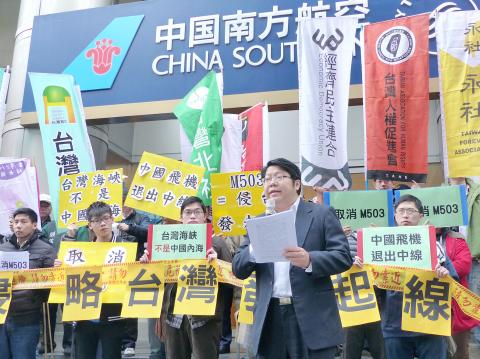More than 100 demonstrators yesterday sang in unison outside the Taipei office of China Southern Airlines to express their opposition to controversial flight routes proposed by Beijing.
Headed by a coalition of social advocacy organizations and pro-independence groups, the protesters demanded that China cancel its plans for flight route M503, which runs close to the median line of the Taiwan Strait.
They said that the proposed route reflected China’s ambitions to encroach on Taiwanese airspace and posed a threat to national security.

Photo: Hsiao Ting-fang, Taipei Times
The groups accused President Ma Ying-jeou’s (馬英九) administration of failing to stand its ground in negotiations with Beijing.
While China originally planned for the new route to take effect today, the Civil Aeronautics Administration (CAA) on Monday said that China has agreed to postpone use of the route.
The CAA also cited an agreement with China that the proposed route would be moved 6 nautical miles (11km) west of its original location.
Premier Mao Chi-kuo (毛治國) on Tuesday said that although he thinks the route should have been moved even further to the west, he considers the adjustment “acceptable.”
Mao’s comments drew criticism from opposition legislators and civic groups alike, who said that the government had failed to safeguard the nation’s sovereignty.
Human rights lawyer Lai Chung-chiang (賴中強) said that civilian flight routes in China are congested as a result of large swathes of airspace being restricted to military use, adding that many areas along the Chinese coast are designated as “war preparation zones” in mind of a potential invasion of Taiwan.
“This is not a problem caused by Taiwan, but rather a problem caused by the People’s Liberation Army,” Lai said.
Lai said that the rally was inspired by Estonia’s “Singing Revolution” in the late 1980s, in which groups of protesters drew strength from choral music as they shouted out their defiance against the Soviet regime.
In Taipei, protesters sang several songs that featured prominently in past social movements, including Ilha Formosa (美麗島) — which was widely sung during anti-authoritarian rallies in the late 1970s — as well as other songs of political significance, such as 2008 power ballad Turning the Tide (逆轉勝) and last year’s Island Sunrise (島嶼天光).
Island Sunrise, written by Kaohsiung-based punk band Fire-EX, was the unofficial anthem of the Sunflower movement, in which tens of thousands of protesters took part in a massive choir to protest the government’s handling of a proposed trade pact with China.
The groups announced further protests leading up to the Boao Forum for Asia, a China-led economic conference scheduled to take place from March 26 to March 29 in China’s Hainan Province.
“Like the Baltic states that held faith in their struggle for independence from the Soviet Union, we should also persist until the end,” Lai said.

An apartment building in New Taipei City’s Sanchong District (三重) collapsed last night after a nearby construction project earlier in the day allegedly caused it to tilt. Shortly after work began at 9am on an ongoing excavation of a construction site on Liuzhang Street (六張街), two neighboring apartment buildings tilted and cracked, leading to exterior tiles peeling off, city officials said. The fire department then dispatched personnel to help evacuate 22 residents from nine households. After the incident, the city government first filled the building at No. 190, which appeared to be more badly affected, with water to stabilize the

DEEPER REVIEW: After receiving 19 hospital reports of suspected food poisoning, the Taipei Department of Health applied for an epidemiological investigation A buffet restaurant in Taipei’s Xinyi District (信義) is to be fined NT$3 million (US$91,233) after it remained opened despite an order to suspend operations following reports that 32 people had been treated for suspected food poisoning, the Taipei Department of Health said yesterday. The health department said it on Tuesday received reports from hospitals of people who had suspected food poisoning symptoms, including nausea, vomiting, stomach pain and diarrhea, after they ate at an INPARADISE (饗饗) branch in Breeze Xinyi on Sunday and Monday. As more than six people who ate at the restaurant sought medical treatment, the department ordered the

Taiwan plans to cull as many as 120,000 invasive green iguanas this year to curb the species’ impact on local farmers, the Ministry of Agriculture said. Chiu Kuo-hao (邱國皓), a section chief in the ministry’s Forestry and Nature Conservation Agency, on Sunday said that green iguanas have been recorded across southern Taiwan and as far north as Taichung. Although there is no reliable data on the species’ total population in the country, it has been estimated to be about 200,000, he said. Chiu said about 70,000 iguanas were culled last year, including about 45,000 in Pingtung County, 12,000 in Tainan, 9,900 in

ALLEGED SABOTAGE: The damage inflicted by the vessel did not affect connection, as data were immediately rerouted to other cables, Chunghwa Telecom said Taiwan suspects that a Chinese-owned cargo vessel damaged an undersea cable near its northeastern coast on Friday, in an alleged act of sabotage that highlights the vulnerabilities of Taipei’s offshore communications infrastructure. The ship is owned by a Hong Kong-registered company whose director is Chinese, the Financial Times reported on Sunday. An unidentified Taiwanese official cited in the report described the case as sabotage. The incident followed another Chinese vessel’s suspected involvement in the breakages of data cables in the Baltic Sea in November last year. While fishing trawlers are known to sometimes damage such equipment, nation states have also